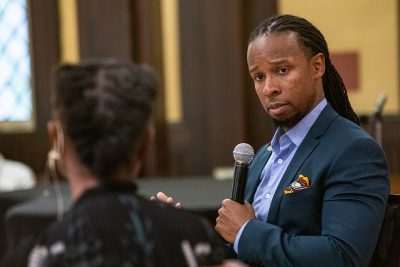
When Ibram X. Kendi isn’t writing a New York Times-bestselling book, collaborating on a cover for Time Magazine, or being named one of the most influential people of the year, he is working to combat racism at Boston University.
Kendi serves as the founder and director of the BU Center for Antiracist Research, which launched in July with the stated mission of understanding, explaining and solving seemingly intractable problems of racial inequity and injustice.
With Kendi’s successful career comes a large internet following: 1.1 million followers on Instagram and more than 378,000 on Twitter. He said a difficulty that comes with such a following is knowing a lot of people are reading and listening to what he says — even typos in his tweets will get a lot of traction.
“There are many people who are going to like it and even many people who are not going to like it or even better, many people who are going to engage on that idea,” Kendi said. “That’s what becomes a challenge.”
And said during his time at BU so far, his team has worked to establish its structure and staff. The Center started off with nothing, he said, so the past few months have been spent developing projects, internal structure and personnel.
“We’re starting to turn idea into actual program,” he said. “And so I feel like it’s been productive.”
Kendi said COVID-19 has hampered the Center’s team-building abilities because not all staff are able to come work in person — some staff members have yet to even meet one another. But, he said this is an experience everyone is facing.
The Center has also continued work on its racial COVID-19 data tracker and will be announcing new projects soon.
“Over the last year, we’ve been closely tracking racial demographic data across the country,” he said. “We also recently announced a collaboration with [Computing and Data Sciences] for our racial data lab.”
The Faculty of CDS is an academic unit made of researchers, scholars and faculty. It works to prompt integration of research, education programs and computer data sciences throughout BU’s academics.
CDS Associate Provost Azer Bestavros wrote in an email he and Kendi have a shared vision for the ability of data to promote evidence-based policy making.
“From the CDS perspective, we are particularly interested in connecting students in computing and data sciences with opportunities,” he wrote, “to apply their data analytics skills to help answer questions that social scientists may have about equity, of which racial equity is an important dimension.”
Bestavros added he wants to ensure those who are interested in developing and changing policies do so by using solid, sound evidence rooted in data and data analytics.
“Data speaks louder than words,” Bestavros wrote. “So, I am inspired to arm those working on problems that are important for our society to do so using the best tools I can provide them.”
Throughout Kendi’s career, he said policy changes have been the best aspect of his work.
“It’s certainly incredible when I get feedback from individuals who have become educated on a topic and are more aware of the existence of racism,” he said, “but nothing compares to actual policies being changed that improves the lives of people who have suffered under the foot of racism.”
Jasmine Gonzales Rose, the associate director of policy, ensures the Center yields effective policy changes through its work. She is also a critical race theorist and professor of law at BU and often tells her students how effective policy work can be.
“What’s so exciting about the Center is now that this is at the forefront of our thinking,” she said. “We’re actually going to be doing work that tries to provide tangible policy products to achieve those ends.”
Gonzales Rose cited many opportunities for students to get involved with the Center, through different avenues such as policy reports, online data and model legislation. Future projects will include a racial policy tracker that will have large student involvement.
“They’re engaging in cutting-edge research that is going to yield tangible policy products,” she said. “Here, they can engage in that work in meaningful ways that are going to impact communities.”
When reflecting on her time working with Kendi so far, she said she is still in awe of his work and career and described him as a “visionary leader” — one who is more empowering than any leader she’s ever worked with.
“He really guides, with a very wise and thoughtful hand and allows a lot of space for you to grow and to learn and to tap into your own knowledge,” she said, “and to ultimately come up with your vision and your strategies and your tactics so it’s incredibly empowering.”






















































































































